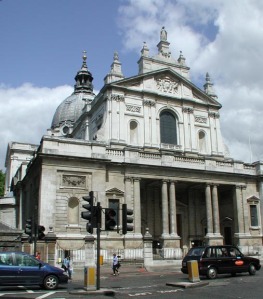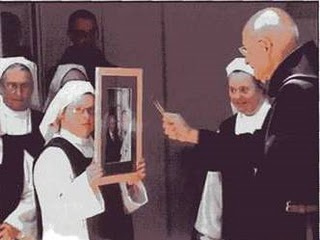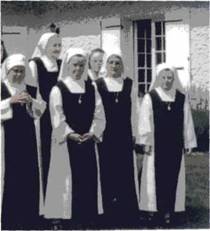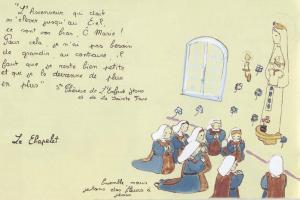On 25th December, 1888, Pope Leo XIII issued his Encyclical
Exeunte Iam Anno to the Patriarchs, Primates, Archbishops, and Bishops, and to all the Faithful in Grace and Communion with the Apostolic See regarding the right ordering of Christian Life:
"14. Here it is fitting We should exhort you whom God has made His helpers by giving the divine power to dispense His Sacraments, to turn to meditation and prayer. If the reformation of private and public morals is needed, it scarcely requires to be said that in both respects the clergy ought to set the highest example. Let them therefore remember that they have been called by Jesus Christ, "the light of the world, that the soul of the priest should shine like a light illuminating the whole world. The light of learning, and that in no small degree is needed in the priest, because it is his duty, to fill others with wisdom, to destroy errors, to be a guide to the many in the steep and slippery paths of life. Learning ought to be accompanied by innocence of life, because in the reformation of man example is far better than precept. "Let your light shine before men, that they may see your good works." The meaning of the divine word is that the perfection of virtue in priests should be such that they should be like a mirror to the rest of men. "There is nothing which induces others more effectively to piety and the worship of God, than the life and example of those who have dedicated themselves to the divine ministry: for, since they are separated from the world and placed in a higher sphere, others look on them as though on a mirror, to take examples from them." Therefore if all men must watchfully heed against the allurements of sin, and against seeking too eagerly fleeting pleasures, it is clear how much more faithful and steadfast ought priests to be. The sacredness of their dignity, moreover -- as well as the fact that it is not sufficient to restrain their passions -- demands in them the habit of stringent selfrestraint, and also a guard over the powers of the soul, particularly the intellect and will, which hold the supreme place in man. "Thou who hast the mind to leave all (says St. Bernard), remember to reckon thyself among what thou wouldst abandon-nay, deny thyself first and before everything." Not before the soul is unshackled and free from every desire, will men have a generous zeal for the salvation of others, without which they cannot properly secure their own everlasting welfare. "There will be one thing only sought (says St. Bernard) by His subjects, one glory, one pleasure - to make ready for the Lord a perfect people. For this they will give everything with much exertion of mind and body, with toil and suffering, with hunger and thirst, with cold and nakedness." The frequent meditation upon the things of heaven wonderfully nourishes and strengthens virtue of this kind, and makes it always fearless of the greatest difficulties for the good of others. The more pains they take to meditate well, the more clearly will they understand the greatness and holiness of the priestly office. They will understand how sad it is that so many men, redeemed by Jesus Christ, are running headlong to eternal ruin; and by meditation upon God they will be themselves encouraged, and will more effectually excite others to the love of God. Such, then, is the surest method for the salvation of all; and in this men must take heed not to be terrified by difficulties, and not to despair of cure by reason of the long continuance of the evil. The impartial and unchangeable justice of God metes out reward for good deeds and punishment for sin. But since the life of peoples and nations, as such, does not outlast their world, they necessarily receive the rewards due to their deeds on this earth. In- deed it is no new thing that prosperity should come to a wrong-doing state; and this by the just counsel of God, Who from time to time rewards good actions with prosperity, for no people is altogether without merit, and this Augustine considered was the case with the Roman people. The law, nevertheless, is clear that for public prosperity it is to the interest of all that virtue-and justice especially, which is the mother of all virtues -- should be practiced, "Justice exalteth a nation; but sin maketh nations miserable." It is not Our purpose here to consider how far evil deeds may prosper, not whether empires, when flourishing and managing matters to their own liking, do nevertheless carry about with them, as it were shut up in their bowels, the seed of ruin and wretchedness. We wish this one thing to be understood, of which history has innumerable examples, that injustice is always punished, and with greater severity the longer it has been continued. We are greatly consoled by the words of the Apostle Paul, "For all things are yours; and you are Christ's, and Christ is God's." By the hidden dispensation of divine providence the course of earthly things is so guided that all things that happen to man turn out to the glory of God for the salvation of those who are true disciples of Jesus Christ. Of these the mother and guide, the leader and guardian is the Church; which being united to Christ her spouse in intimate and unchangeable charity is also joined to Him by a common cause of battle and of victory. Hence We are not, and cannot be anxious on account of the Church, but We greatly fear for the salvation of very many, who proudly despise the Church, and by every kind of error rush to ruin; We are concerned for those States which We cannot but see are turned from God and sleeping in the midst of danger in dull security and insensibility. "Nothing is equal to the Church;" (says St. John Chrysostom,) "how many have opposed the Church and have themselves perished? The Church reaches to the heavens; such is the Church's greatness. She conquers when attacked; when beset by snares she triumphs; she struggles and is not overthrown, she fights and is not conquered." Not only is she not conquered, but she preserves that corrective power over nature, and that effective strength of life that springs from God Himself, and is unchanged by time. And, if by this power she has freed the world grown old in vice and lost in superstition, why should she not again recover it when gone astray? Let strife and suspicion at length cease, let all obstacles be removed, give the possession of all her rights to the Church, whose duty it is to guard and spread abroad the benefits gained by Jesus Christ, then We shall know by experience, where the light of the Gospel is, and what the power of Christ can do. 15. This year, which is now coming to an end, has given, as We have said, many signs of a reviving faith. Would that like the spark it might grow to an ever-increasing flame, which, by burning up the roots of sin, may open a way for the restoration of morals and for salutary counsels. We, indeed, who steer the mystical barque of the Church in such a storm, fix Our mind and heart upon the Divine Pilot Who holds the helm and sits unseen. Thou seest, Lord, how the winds have borne down on every side, how the sea rages and the waves are lashed to fury. Command, we beseech Thee, Who alone canst, the winds and the sea. Give back to man that tranquillity and order-that true peace which the world cannot give. By Thy grace let man be restored to proper order with faith in God, as in duty bound, with justice and love towards our neighbor, with temperance as to ourselves, and with passions controlled by reason. Let Thy kingdom come, let the duty of submitting to Thee and serving Thee be learnt by those who, far from Thee, seek truth and salvation to no purpose. In Thy laws there is justice and fatherly kindness; Thou grantest of Thy own good will the power to keep them. The life of a man on earth is a warfare, but Thou lookest down upon the struggle and helpest man to conquer, Thou raisest him that falls, and crownest him that triumphs."
 By now, many of you have already heard that Grant Desme, an awesome baseball player for the Oakland A's has been discerning a call to the priesthood, and recently he has decided to follow that call. What some of you may not know is that Desme is not planning on studying for a diocesan priesthood. That is not the case at all. Rather, he will be studying for the priesthood within a group of canons called the Canons Regular of Premontre.
By now, many of you have already heard that Grant Desme, an awesome baseball player for the Oakland A's has been discerning a call to the priesthood, and recently he has decided to follow that call. What some of you may not know is that Desme is not planning on studying for a diocesan priesthood. That is not the case at all. Rather, he will be studying for the priesthood within a group of canons called the Canons Regular of Premontre.


























